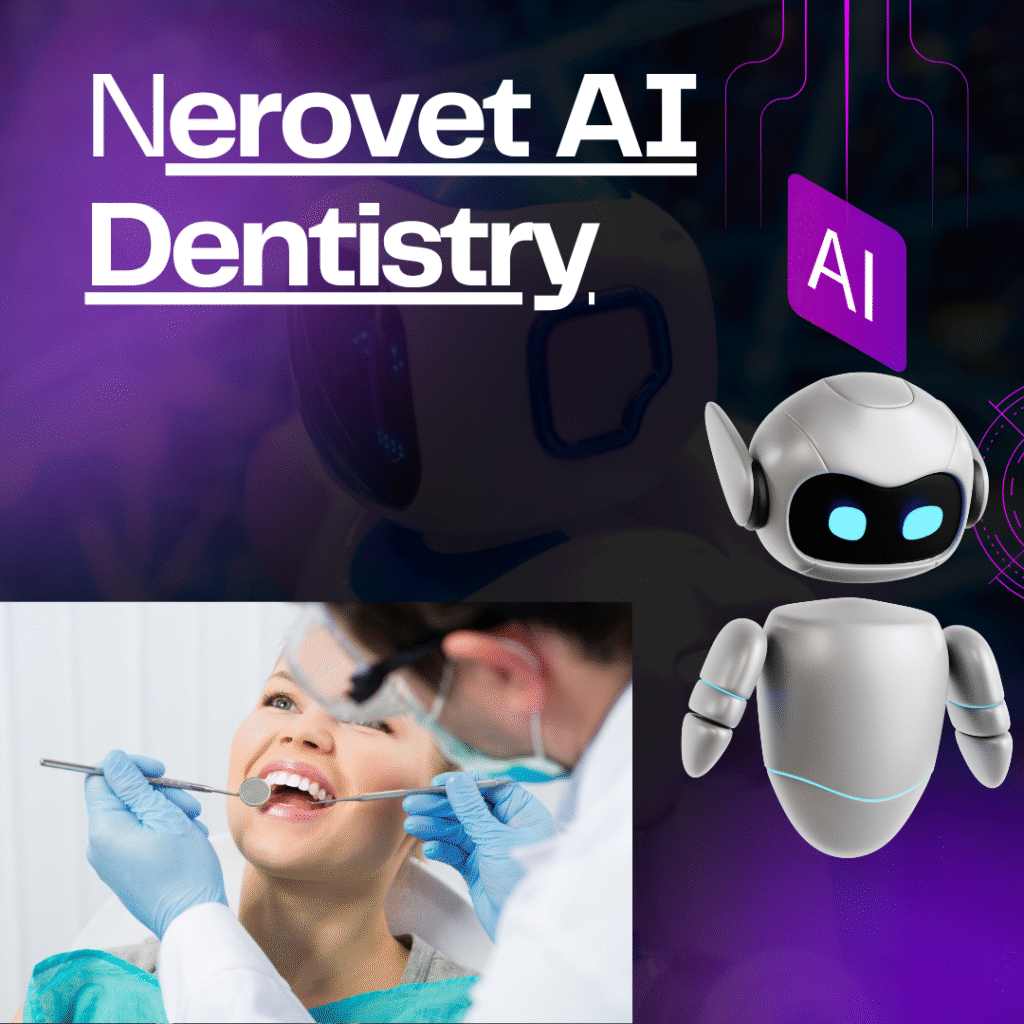The world of dentistry is undergoing a quiet revolution. While most patients still picture dental care as check-ups, cleanings, and X-rays, the rise of Nerovet AI dentistry is pushing the field far beyond those basics. By using artificial intelligence, dental practices can now analyze images with unmatched accuracy, create personalized treatment plans, and even predict long-term risks. This shift is not just about technology—it’s about improving patient care, saving time, and making dental visits more effective. The truth is, Nerovet AI dentistry is transforming everything from diagnostics to education, and it’s changing the way dentists and patients think about oral health.
Read also: Why Osteopur Still Matters in Women’s Health and Aging Populations
Diagnostic Applications of Nerovet AI Dentistry
Solution – Early Detection Through Imaging Analysis
One of the most powerful applications of Nerovet AI dentistry is in diagnostic imaging. Using advanced algorithms, AI can scan X-rays, 3D scans, and digital impressions to find early signs of cavities, gum disease, or bone loss. In some cases, it spots issues long before a human eye can. This means patients can receive treatment early, preventing major dental problems down the line.
Problem – Accuracy Limits and Dependence on Data Quality
However, AI is not flawless. Nerovet AI dentistry relies heavily on large, high-quality data sets. If the data is limited, biased, or incomplete, the AI can make errors in interpretation. Dentists may also struggle to balance trust in AI tools with their own clinical judgment. Over-reliance without human oversight could lead to misdiagnosis, reminding us that AI should act as a partner, not a replacement.
Personalized Treatment Planning
Solution – Customizing Orthodontics and Implant Placement
A major advantage of Nerovet AI dentistry is its role in personalized care plans. By analyzing patient data, AI can recommend the best orthodontic adjustments, predict jaw movement, and suggest implant placement with precision. This makes treatments faster, safer, and tailored to each individual’s needs. For patients, it means fewer adjustments and better long-term outcomes.
Problem – High Cost and Limited Access in Small Clinics
The challenge is affordability. Many smaller dental clinics may find AI-driven systems expensive to implement. Advanced scanners, imaging software, and AI tools come with significant costs. This limits access, particularly in rural or underfunded healthcare settings. Without wider adoption, the benefits of Nerovet AI dentistry could remain concentrated in larger or urban practices.
Enhancing Patient Care
Solution – Faster Appointments and AI-Powered Consultations
Beyond treatment, Nerovet AI dentistry is reshaping the patient experience. AI-powered chatbots can answer questions, schedule appointments, and provide pre-visit instructions. Inside the clinic, AI speeds up analysis, reducing wait times for results. Patients feel more informed, less anxious, and more engaged in their dental care when technology supports smoother communication.
Problem – Trust Issues and Fear of Replacing Human Dentists
Still, many patients worry about technology replacing the human touch. Dental visits are personal, and people value the relationship with their dentist. When patients hear about AI making decisions, some fear losing that personal connection. To succeed, Nerovet AI dentistry must be framed not as replacing dentists, but as empowering them to spend more time on care and less on routine tasks.
Education and Professional Training
Solution – Simulated Cases for Dental Students
For dental students and professionals, Nerovet AI dentistry offers a new way to learn. Through simulations and case analysis, AI can expose learners to thousands of dental scenarios they might never see in school. Students can practice diagnosing rare conditions, testing treatments, and reviewing digital models. This training builds confidence and ensures the next generation of dentists is more prepared.
Problem – Lack of Human Judgment in Complex Scenarios
Even with advanced training, AI cannot replace the wisdom and intuition of experienced dentists. Some cases involve complex emotional or medical considerations that go beyond data. Relying too heavily on AI for education may leave students less prepared for real-world nuance. For this reason, Nerovet AI dentistry should complement, not replace, traditional clinical experience.
Efficiency in Dental Practices
Solution – Automating Admin Tasks and Improving Workflow
Dentistry involves much more than clinical work. Scheduling, billing, and record-keeping often consume valuable time. Nerovet AI dentistry improves efficiency by automating these tasks, allowing staff and dentists to focus on patients. This streamlined workflow not only saves time but also reduces human error in managing records and payments.
Problem – Data Security and Privacy Concerns
With automation comes risk. Dental records contain sensitive personal information, and storing them digitally increases the chance of data breaches. If systems are not secure, patients may face privacy issues. Building robust cybersecurity frameworks is essential if Nerovet AI dentistry is to maintain trust while handling sensitive medical data.
Why Nerovet AI Dentistry Is More Than Just Technology
The power of Nerovet AI dentistry lies in its ability to blend science with care. It offers clear benefits:
- Early and accurate detection of dental issues
- Personalized and precise treatment planning
- Improved patient experiences with faster service
- Better education for dental professionals
- Increased efficiency in day-to-day operations
But these gains come with responsibilities—ensuring fair access, protecting data, and keeping human expertise at the center.
Conclusion
Nerovet AI dentistry is not just about machines reading X-rays or automating check-ups. It represents a new era where technology and healthcare meet to create stronger, safer, and more patient-centered dental care. From diagnostics to treatment planning, from education to efficiency, AI is reshaping the way we think about oral health. Still, challenges like cost, trust, and security must be addressed to unlock its full potential. By treating AI as a supportive tool rather than a replacement, dentists and patients can embrace the best of both worlds. The future of dentistry is here—and Nerovet AI dentistry proves that it’s about much more than just brighter smiles.

